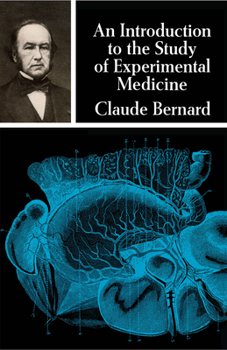An Introduction to the Study of Experimental Medicine
Select Format
Select Condition 
Book Overview
Clear and penetrating presentation of the basic principles of scientific research from the great French physiologist whose contributions in the 19th century included the discovery of vasomotor nerves; nature of curare and other poisons in human body; functions of pancreatic juice in digestion; elucidation of glycogenic function of the liver.
Format:Paperback
Language:English
ISBN:0486204006
ISBN13:9780486204000
Release Date:June 1957
Publisher:Dover Publications
Length:272 Pages
Weight:0.85 lbs.
Dimensions:0.6" x 5.4" x 8.0"
Customer Reviews
2 ratings
My preliminary Ph.D. examination
Published by Thriftbooks.com User , 16 years ago
In 1950 I took my Ph.D. preliminary examination. It consisted of four questions, with half a day to answer each question. A half hour after beginning the exam, I asked for a typewriter. The first question on the exam was "It has been said that dead anatomy teaches nothing. Who said this and what did he mean?" I wrote for three hours. I knew it was Claude Bernard and I agreed with him completely. This little book is so important in my mind that when recently writing my autobiography with the help of my wife I recalled the above story and had to buy the book again. Don Bucklin Ph.D.
The wonderful world of homeostasis
Published by Thriftbooks.com User , 24 years ago
As Bernard puts it: "I think I was the first to urge the belief that animals have really two environments: a milieu extérieur in which the organism is situated, and a milieu intérieur in which the tissue elements live. The living organism does not really exist in the milieu extérieur (the atmosphere it breathes, salt or fresh water if that is the element) but in the liquid milieu intérieur formed by the circulating organic liquid which surrounds and bathes all the tissue elements; this is the lymph or plasma, the liquid part of the blood which, in the higher animals, is diffused through the tissues and forms the ensemble of the intercellular liquids and is the basis of all local nutrition and the common factor of all elementary exchanges. A complex organism should be looked upon as an assemblage of simple organisms which are the anatomical elements that live in the liquid milieu intérieur."This book is a wonderful book for the biology student or for anyone interested in how medicinal studies and biology "began." Claude Bernard introduces his idea of homeostasis in this book and he explains how and why it works, and how humans, as well as animals, could not live without such an idea.I recommend reading of this book. It kept me busy for hours and I didn't want to put it down. Five stars for excellence, intelligence, and much much more. Read it for yourself and you be the jugde!





